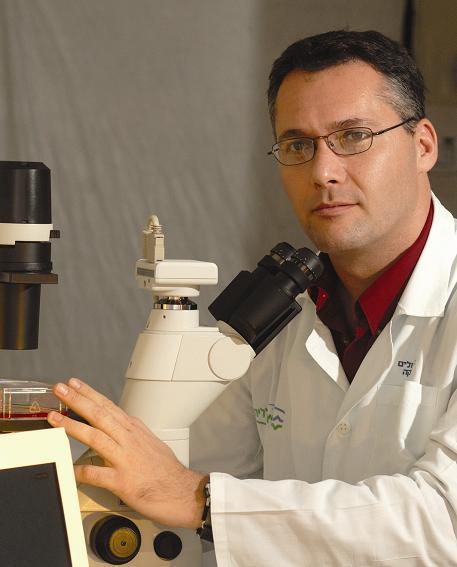This is according to a new study at Ben-Gurion University led by Dr. Eli Lewis, head of the laboratory for research on transplants and diabetes at the university

A team of researchers from Ben-Gurion University, led by Dr. Eli Lewis, proved that treating diabetic animals with a protein called alpha-1-antitrypsin (AAT), as part of a pancreatic islet transplant, prevents the inflammation that causes the transplanted islets to fail to function. Similar significant results using the same component, human AAT, but in an alternative diabetic animal model, were published in the scientific journal Proceedings of the National Academy of Sciences (PNAS)). Both works gave a real indication that the decrease in inflammation is the key to the survival of beta cells in the pancreatic islets.
Dr. Eli Lewis, Head of the Laboratory for Transplantation and Diabetes Research at Ben-Gurion University: "We found that by simultaneously inhibiting several inflammatory molecules while using a safe treatment, free of toxic side effects for the beta cells of the pancreas or steroids, inflammation can be blocked so effectively that it becomes possible Reorganization of the immune response, so that it helps the absorption of the implant in the body."
According to him, treatment of diabetic patients with the help of human pancreatic islet cell transplantation may allow a normative blood glucose level without the need for insulin injections. Nevertheless, despite the use of immunosuppressive treatments given today, the transplants do not survive long due to chronic inflammation that destroys the cells that produce insulin; Within five years after the transplant, most patients return to insulin injections.
Dr. Lewis says that treating diabetic mice with AAT - a human anti-inflammatory molecule produced naturally in our bodies - during a short 14-day single-drug treatment period after pancreatic islet transplantation, created a state of protection around the transplant site and preserved the function of the pancreatic islets for more than 120 days after the end of treatment. "To our surprise, after the implants were removed and a second series of transplants was performed, the animals accepted islets from the same original donor strain without further treatment - while properly rejecting foreign islets. The immune system has been, so to speak, "re-educated" by AAT allowing the implants to be recognized as "friendly" and absorbed into the body," Lewis said.
Islet transplantation
Transplantation of human pancreatic islets in diabetic patients is considered a realistic option today. In this process, which is carried out in about 50 medical centers in the world, the islets are collected from donors in a sterile laboratory immediately after the death of the donor is determined. At the same time, a diabetic patient who is a candidate for treatment is located and a team of transplanters is recruited. In a relatively simple surgical process, islets are transferred into the liver under local anesthesia, and the patient receives minimal drug coverage designed to block the immune system. In this way, complete independence from insulin is achieved.
Unfortunately, the islet mass rapidly declines after transplantation due to strong local inflammation. Moreover, there is no anti-inflammatory coverage following the removal of steroids from the treatment protocol. For this reason, the typical transplant recipient will receive at least two transplants in order to restore glucose levels to normal. But perhaps the most frustrating information is found in the latest report according to which a five-year follow-up of islet function reveals that there is high islet erosion caused in part by prolonged, unchecked inflammation. In fact, over 80% of transplant recipients return to self-injecting insulin after this period of time. Therefore, there is a demand for the development of a safe, applicable and effective anti-inflammatory treatment.
"Our research is being published at a critical time, as the treatment that the transplant team has used so far has supposedly turned its back on the patients and it does not protect the pancreatic islets over time," explains Dr. Lewis. "While many have lost faith in this method, our paper offers a safe drug therapy, which is widely used, to provide the precise coverage that is currently lacking to allow successful transplantation and long-term uptake. In fact, we are almost replacing the need for steroids in this specific context by blocking inflammation where steroids would work, but without their side effects.”
Human AAT has been used for over 20 years as weekly intravenous injections to treat rare cases of genetic alpha-1-antitrypsin deficiency. In these prolonged treatments, AAT demonstrates an impressive level of safety.
The US Food and Drug Administration (FDA) has already approved a human clinical trial to begin testing the effect of AAT in type 1 diabetic patients who are undergoing transplant procedures at the University of Colorado, USA. Other clinical trials around the world are currently being evaluated.
On the same topic on the science website:
- Bone marrow cells became insulin-producing cells in mice
- Stem cells for the benefit of diabetics
- Development of a cure for juvenile diabetes with the help of genetic engineering of human cells
- We may finally have found a use for the spleen: aiding in the production of insulin
- There are no mature stem cells in the pancreas
